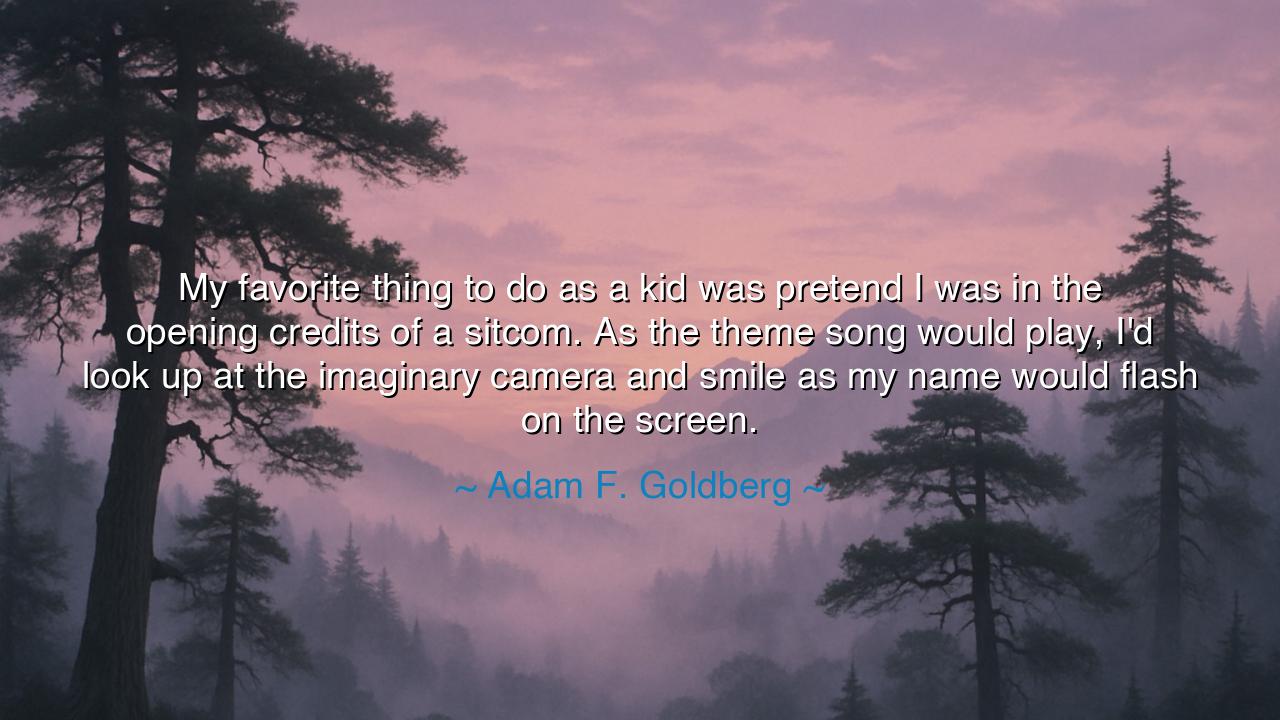
My favorite thing to do as a kid was pretend I was in the opening
My favorite thing to do as a kid was pretend I was in the opening credits of a sitcom. As the theme song would play, I'd look up at the imaginary camera and smile as my name would flash on the screen.






Hearken, O seeker of wisdom, and reflect upon the words of Adam F. Goldberg: “My favorite thing to do as a kid was pretend I was in the opening credits of a sitcom. As the theme song would play, I'd look up at the imaginary camera and smile as my name would flash on the screen.” Within this tender recollection lies a meditation on the power of imagination, the joy of self-expression, and the formative influence of playful vision upon the human spirit.
Since the earliest days, philosophers and storytellers have understood that the seeds of greatness are often sown in the playful imaginings of youth. Plato spoke of the soul’s early flights, of the mind rehearsing life’s virtues and adventures before they are realized. Goldberg’s memory mirrors this ancient insight: the act of pretending, of envisioning oneself at the center of a story, cultivates confidence, creativity, and the capacity to dream beyond present circumstances.
Consider the young Leonardo da Vinci, who, in the quietude of his mind, imagined machines, flying devices, and grand inventions. Long before the world could witness their fruition, his imagination prepared him for creation. Like Goldberg, he rehearsed possibilities, smiling at the imagined acclaim, envisioning the unfolding of potential. Even in childhood play, the mind practices the arts of attention, self-awareness, and joyful anticipation, laying the groundwork for achievement.
There is a quiet heroism in this playful rehearsal. To imagine oneself not merely as a participant, but as a protagonist in a larger narrative, is to nurture courage and self-expression. The ancients revered those who could envision their own paths, who practiced the virtues of presence, poise, and intention even in moments of solitary play. Goldberg’s act of looking up at an imaginary camera and smiling is emblematic of this nurturing of the self.
Even in modern history, the transformative power of childhood imagination is evident. Walt Disney, in his youth, played with sketches, puppets, and imagined worlds, crafting stories in which he was both creator and participant. These playful exercises were the foundation of a lifetime devoted to storytelling that brought smiles to millions. Goldberg’s reflection reminds us that even the simplest childhood games are crucibles for creativity, confidence, and joy.
The lesson is clear: the imaginative acts of youth carry profound significance. Pretending, envisioning oneself in moments of triumph or storytelling, cultivates self-assurance, joy, and aspiration. The smiles conjured in these private acts are not trivial; they are exercises in mastery of presence, rehearsal of courage, and the shaping of character.
From this reflection, practical counsel emerges: embrace play, creativity, and visualization at every stage of life. Allow yourself moments to imagine, to rehearse, and to smile at the unfolding of your own narrative. By practicing presence, confidence, and imaginative engagement, you cultivate the inner fortitude to act boldly when life’s real cameras are upon you.
Thus, let each heart carry this ancient truth: joy, vision, and self-expression are the foundation of accomplishment. Adam F. Goldberg reminds us that in pretending, imagining, and smiling at one’s own potential, the soul learns to navigate the stage of life with courage, delight, and grace. From the playful act of childhood to the accomplishments of adulthood, imagination and joy illuminate the path toward a life well-lived.
If you wish, I can also craft a short, audio-friendly version of this reflection, rhythmically structured with emotional peaks and pauses to enhance its impact for narration. Do you want me to create that version?






AAdministratorAdministrator
Welcome, honored guests. Please leave a comment, we will respond soon